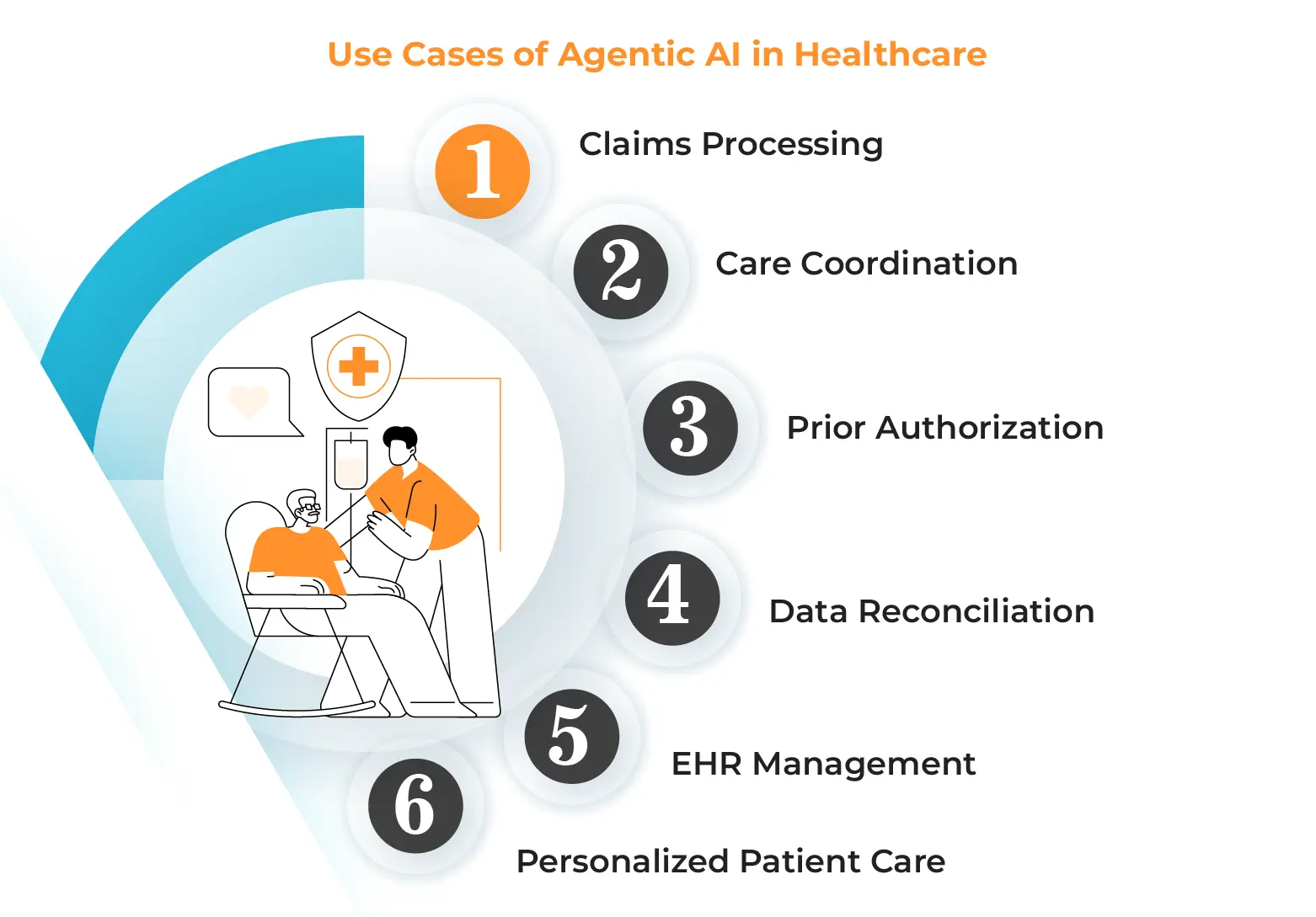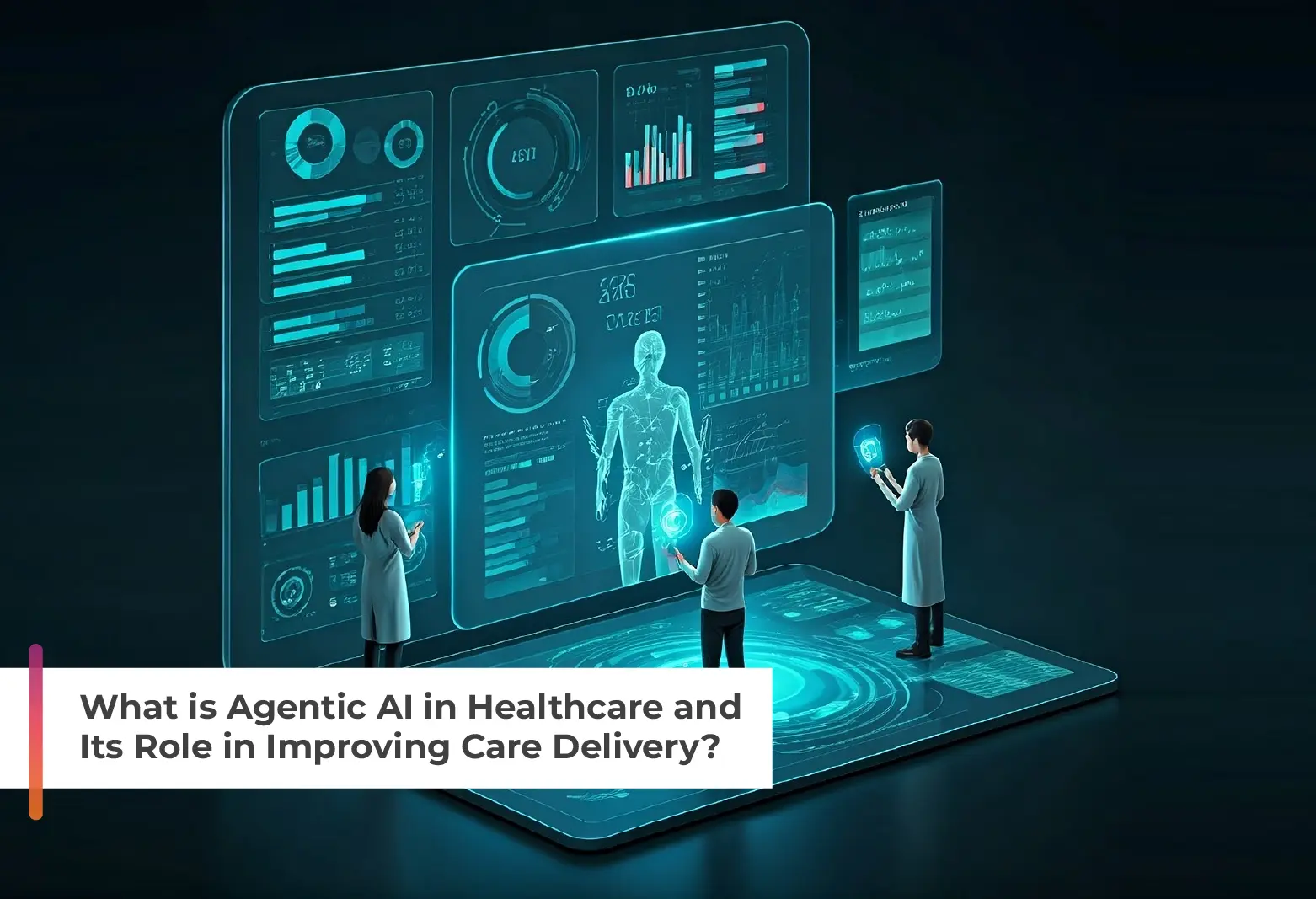The evolution of Artificial Intelligence (AI) has been transformative for many industries, and healthcare is no exception. From early implementations of diagnostic algorithms to advanced robotic surgeries, AI in healthcare has redefined what’s possible in patient care delivery.
Conventional AI relies on pre-existing models and centralised systems, making it ineffective in dynamic, isolated emergencies where connectivity and real-time decisions are critical.
Here, Agentic AI in healthcare can proactively take action, make decisions, and improve processes autonomously. But how does it make all possible? Let’s go through this blog and explore how Agentic AI applications in healthcare brings a new dimension to modern medicine.
What is Agentic AI and How Does it Work?
Agentic AI represents a significant leap forward from traditional AI systems. Unlike conventional AI Tools for Healthcare that follow predetermined paths, agentic AI systems possess autonomous decision-making capabilities and can adapt their responses based on context and experience. These systems can understand objectives, formulate plans, and take independent actions to achieve goals while aligning with human values and medical protocols.
At its core, agentic AI operates on three fundamental principles:
- Autonomy in decision-making within defined parameters
- Continuous learning from interactions and outcomes
- Goal-oriented behavior with the ability to adjust strategies
What does Agentic AI Means for Healthcare?
Agentic AI applications in healthcare includes features like machine intelligence, natural language management and analytical processing of big data, which help healthcare providers in multiple ways. Let’s see how it functions for healthcare delivery-
-
Decision Support
Agentic AI in healthcare delivery provides valuable recommendations to healthcare providers, guiding them toward the most effective treatment approaches. For clinicians, these treatment options must be derived from real-time data gathered during the earlier stages.
-
Data Collection
Agentic AI tools for healthcare interfaces integrate with various systems to extract electronic health records, medical reports and other data from wearables. This way of gathering data is valuable for generating a broad understanding of a patient’s health.
-
Analysis Agent
Leveraging machine learning algorithms, AI tools for healthcare examine the data to identify patterns, correlations, and anomalies. For instance, Agentic AI improves patient care by spotting early indicators of potential health concerns by detecting irregular patient vital signs trends and facilitating prompt interventions.
Data Overload and Other Challenges in Healthcare
According to a report, by 2025, around 180 zettabytes of data will be generated globally, with healthcare data contributing more than one-third.
However, only 3% of healthcare data is effectively utilised due to outdated systems incapable of processing large-scale, multi-modal data. This inefficiency forces clinicians to manually sift through vast amounts of information to derive insights, leaving critical opportunities for timely care unrealised.
This challenge is growing exponentially. The National Institutes of Health (NIH) estimates that medical knowledge doubles every 73 days, especially in fields like oncology, cardiology, and neurology. This overwhelming influx of data puts immense pressure on healthcare providers to make accurate decisions in increasingly limited timeframes. The impact of data overload in healthcare leads to challenges like-
- Cognitive Overload: Clinicians face unmanageable amounts of data and must derive actionable insights under tight time constraints.
- Fragmented Systems: Data is scattered across various platforms, leading to delays and inefficiencies.
- Care Plan Orchestration: Manual processes, like scheduling or test requests, slow down care delivery and introduce errors.
For example- Consider a routine cholesterol screening for a patient with suspected cardiovascular disease. The patient’s blood test results are uploaded into the electronic medical record (EMR), but the physician must manually cross-check the data with other factors such as medication history, checking existing medical conditions and previous medical reports and images.
Without an intelligent system to automatically integrate and flag critical data, the physician might miss a subtle but crucial correlation, such as a high cholesterol level combined with an elevated blood glucose level—an indicator of metabolic syndrome.
Agentic AI & Its Role in Improving Care Delivery
Agentic AI in healthcare can help providers in multiple operations and ensure they have enough time for patients. Let’s have a closer look at how Agentic AI in healthcare benefits patient care delivery-

-
Claims Processing
Agentic AI in healthcare streamlines healthcare insurance claims processing by reviewing documentation, detecting discrepancies, and flagging issues for human intervention when necessary. They support clinical teams in ensuring fairness and regulation compliance while enhancing decision accuracy.
These agents optimise workflows, significantly reduce approval times, and minimise administrative workloads by leveraging real-time data and predictive analytics.
Agent’s Role: The agent uses memory to track claim histories, integrates with APIs to verify eligibility, and plans the necessary steps to accelerate approvals, ensuring smoother workflows throughout the claims process.
-
Care Coordination
Fragmented information across multiple systems often hampers effective care management. Agentic AI in care delivery addresses this challenge by collecting and synthesising data from electronic health records (EHRs), care management platforms, and scheduling systems to streamline workflows.
These agents predict which high-risk patients need immediate attention and facilitate seamless collaboration across care teams, reducing preventable hospital readmissions and enhancing patient outcomes.
Agent’s Role: The agent invokes specialised sub-agents to retrieve data from various sources, consolidates the information into a comprehensive view, and automates coordination. This ensures efficient communication and prioritisation among care teams.
-
Prior Authorization
Agentic AI in healthcare autonomously manages prior authorisations by evaluating resource usage, eligibility criteria, and required documentation. They proactively identify potential bottlenecks, cutting the review process by up to 40% and providing transparency for healthcare providers and payers.
Agent’s Role: The agent retrieves patient and billing data, applies rules to verify authorisation eligibility, and executes the workflow autonomously, minimising manual intervention and speeding up the approval process.
-
Data Reconciliation
Reconciling payment data from claims to provider payments is often time-consuming and error-prone. AI agents automate this process by cross-referencing claims, provider records, and financial transactions to ensure accurate payment matching. This automation reduces manual effort, improves accuracy, and flags discrepancies for quick resolution.
Agent’s Role: The agent integrates with financial databases, claims systems, and provider records, identifying inconsistencies in payment amounts or timelines and facilitating rapid resolution of any issues.
-
EHR Management
Agentic AI in healthcare streamlines electronic health record (EHR) management by consolidating data from multiple sources, keeping records updated, and automating routine tasks like chart updates and follow-ups. This ensures clinicians have real-time access to accurate and organised patient information. Agents also improve interoperability, enabling seamless data exchange between systems and enhancing care delivery.
Agent’s Role: The agent unifies patient data, flags missing or inconsistent information, and ensures records are continuously updated, reducing administrative workloads and improving efficiency.
-
Personalized Patient Care
Agentic AI in healthcare enables personalised care by analysing a patient’s medical history, genetics, lifestyle, and ongoing treatments. They create tailored care plans, predict potential risks, and recommend preventive measures. Agentic AI improves patient engagement and adherence to care plans through personalised communication and reminders.
Agent’s Role: The agent analyses diverse patient data to recommend individualised care plans, monitors progress, and ensures care evolves with patient needs, driving better outcomes.
Challenges and Considerations While Implementing Agentic AI in Healthcare
While the benefits are undeniable, implementing Agentic AI in healthcare isn’t without hurdles:
- Data Privacy and Security: Patient data confidentiality is paramount, especially with stringent regulations like HIPAA.
- Integration Costs: Deploying Agentic AI systems requires significant investment in infrastructure and training.
- Ethical Concerns: Questions around accountability and decision-making autonomy remain areas of concern.
- Adoption Resistance: Healthcare professionals may hesitate to trust AI systems, highlighting the need for clear communication and training.
Addressing these challenges will require a collaborative approach involving policymakers, technologists, and healthcare providers.
The Future of Healthcare with Agentic AI
The future of healthcare with agentic AI presents an exciting frontier where technology and human expertise converge to create more efficient, accessible, personalised healthcare services. As these systems continue to evolve, we can anticipate:
- More sophisticated customised treatment plans
- Enhanced predictive healthcare analytics
- Improved healthcare accessibility in underserved areas
- Reduced healthcare costs while maintaining quality
- Better work-life balance for healthcare professionals
Integrating agentic AI in healthcare isn’t just about automation – it’s about augmenting human capabilities to deliver better patient outcomes. As we progress, the synergy between healthcare professionals and AI will continue redefining what’s possible in medical care.
Agentic AI in healthcare offers significant support across various operational aspects, ultimately allowing healthcare providers to focus more on patient care. Agentic AI can streamline workflows and reduce administrative burdens by automating routine tasks and enhancing clinical decision-making.
